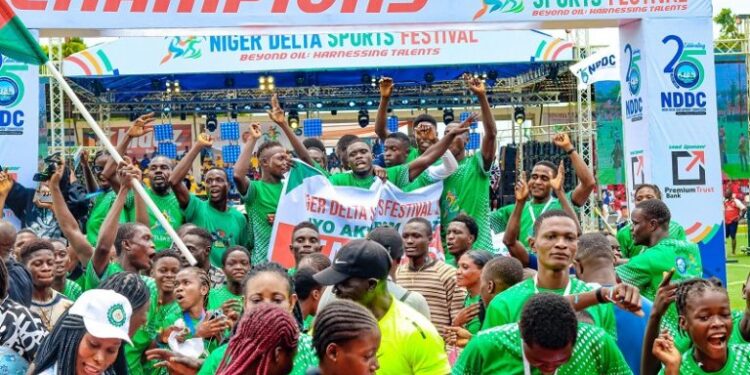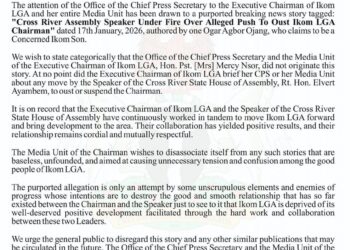The just-concluded Niger Delta Development Commission (NDDC) Sports Festival has sparked a flurry of mixed reactions among Cross Riverians. Many had high hopes that the state would dominate the competition, making the perceived outcome disappointing for some. Among the trending narratives are allegations of poor performance by Cross River State, financial misappropriation claims against the Commissioner for Sports, Mrs. Agnes Atsu, and accusations that the NDDC Commissioner, Rt. Hon. Orok Duke hijacked the games.
One controversial article, written by a certain Patrick Unimke Atsu, whose identity remains questionable, posed pointed questions such as: “Why has the Commissioner for Sports in Cross River State been relegated to the background?” and “Why does Orok Duke continue to dominate and interfere in sports administration, traveling with teams and reportedly allocating millions for logistics, yet offering athletes and officials mere peanuts?”
However, a closer look at the facts reveals a different story – one that may clarify much of the confusion and speculation:
1. The NDDC Sports Festival, according to the Co-Chairman of the maiden Niger Delta Sports Festival, Itiako Ikpokpo, the main objective is not just about winning medals but about identifying and nurturing young, talented athletes with the potential to represent Nigeria on the international stage in the future.
2. For the funding, which seems to be controversial and of major interest to Cross Riverians, the Cross River State Ministry of Sports received a total of #57 million from the NDDC to prepare for the event in Uyo. According to NDDC’s budget breakdown, seven (#7) million was designated for both Specific Training/ Competition equipment, Kitting (wear), and printing and cresting; #12 million was reportedly used by the State Ministry of Sports’ Director of Sports, who handled the purchase of the equipment.
3. While Fifty (#50) million was allocated for the scouting process by the NDDC. According to an insider who pleaded anonymity, the scouting was conducted by Mr Ekanem Ekpenyong, Special Adviser to the Governor on Sports under the supervision of the commissioner for Sports, Hon Agnes Atsu, across the three senatorial districts of the state, adhering to the NDDC’s guideline of scouting for novice athletes — from the North to the Central and South. A total of 450 athletes were selected, registered, camped, and trained in Calabar, where they were fed 3 square meals for 11 days. Upon completion of the 11 days of camping, the 450 athletes were paid ten thousand Naira (#10,000) for those who didn’t stay in camp and eight thousand (#8,000) for those who didn’t stay in camp as training allowances and demobilised them accordingly. After the camping, a total of 313 out of 450 athletes were taken to Uyo for the Sports Festival. Meanwhile, before this time, officials, including coaches and Area Sports Officers, were paid scouting allowances at the Senatorial District and Local Governments levels.
4. An additional thirteen (#13) million was sent directly to Queen Gladys O. Festus, the NDDC Secretary for Cross River (appointed by NDDC specifically for this event), to cover transportation to and from Uyo, and the accommodation, and feeding, medical care, and other logistics were handled by the NDDC local organising Committee. According to findings, the disbursement of the 13 million was not handled directly by the Ministry of Sports but by Gladys.
5. Upon reaching Uyo, the NDDC Commissioner for Cross River State, Rt Hon Orok Duke who was alleged to have “dominated and interfered in sports administration, traveling with teams and reportedly allocating millions for logistics, yet offering athletes and officials mere peanuts”, only attended the flag-off ceremony and was never found anywhere interfering in the management of finances as it concerns the Sports Festival as alleged by a certain Patrick Atsu. Also reports has that he got funding directly from NDDC for his table tennis team, which he travelled with, not through the state government.
6. As it concerns the performance of the athletes, Cross River State secured a total of 31 medals 5 out of which were gold medals, 7 silver medals, and 19 bronze medals. The 31 medals could only place Cross River State first from the bottom table in the medal chart, followed by Abi with 32, Akwa Ibom with 37, Imo with 42, and so on. However, as quoted by the Co-Chairman of the maiden Niger Delta Sports Festival, Itiako Ikpokpo, “The main objective is not just about winning medals but about identifying and nurturing young, talented athletes with the potential to represent Nigeria on the international stage in the future.” Itiako, in an interview, further explained that those so far discovered were between the ages of 14 and 21 years, adding that the Talent Scouting and Mentoring Committee would be in charge of grooming the discovered promising athletes to become future champions. States such as Cross River, Akwa Ibom, and Imo etc stand to gain significantly from focusing on younger, emerging talents.
7. From the findings, part of the reason for the poor performance was the lack of investment in the sports sector for over a decade which led to the decay of the sports facilities and relocation of athletes from the state to other well-paying states and foreign countries. However, reports have it that the sector is taking a different dimension as the current government under Governor Bassey Otu is showing keen interest in sports development.
8. For the protest by the athletes, it was reported that four states, including Ondo, Imo, Abia, and Cross River State, protested against delays in their allowances of seventy (70,000) thousand by the NDDC. Following the protest, an NDDC representative addressed the protesters explaining that the delays were due to administrative procedures and some errors arising from unmatched/wrong bank details. In the case of Cross River State, an additional thirty thousand naira was to be given to the athletes. From the thirty thousand, ten thousand was given to the athletes before departure to Uyo and the balance of twenty thousand was to be paid upon return to the state. However, the athletes insisted that they must be paid their due before going back to Calabar, and from the reports, the management complied with their demands.
In light of these facts, it becomes apparent that while there may be room for questions or improvements in coordination, much of the public criticism appears to stem from misinformation or lack of clarity on how the festival was structured and funded. As investigations continue, discussions around the NDDC Sports Festival must remain grounded in verified information, not fiction or politically motivated narratives.
Inakefe Denis ANIPR
A Media Practitioner writes from Calabar.
#mediachiefpriest
















